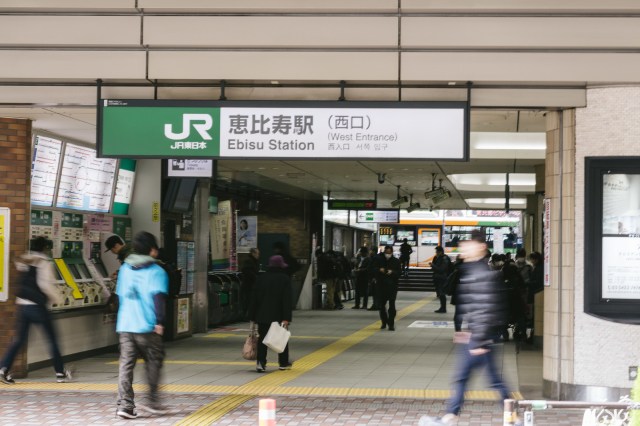
Railway company’s dedication to customer service backfires, landing it in hot water instead.
If there’s one thing Japan Rail prides itself on, it’s providing customers with excellent service. It’s the reason why trains are clean and on time, and why staff run through so many safety checks with each departure. However, their latest commitment to customer service ended up backfiring recently, as it led to the company being branded as discriminatory instead.
The incident occurred at Ebisu Station, which is run by East Japan Railway Company (JR East) and Tokyo subway operator Tokyo Metro. Inside the station, just before you exit the ticket gates, there are four overhead signs that guide transferring passengers to the Hibiya Line, written in Japanese, English, Korean, and Russian.
On 7 April, the Russian sign mysteriously disappeared, with a long piece of white paper covering it, and a smaller sign reading “調整中” (“chousei chuu” or “under adjustment”) stuck on top. Commuters began to notice the sudden disappearance of the Russian-language sign, taking to social media to question why it was the only sign removed from the display. Given the anti-Russian sentiment currently on the rise internationally due to the Russian invasion of Ukraine, many saw it as a discriminatory move.
That piqued the interest of media outlets, who headed down to the station to report on the situation, questioning staff about it as well.
▼ This news report shows the changes made to the sign at the station.
Following enquiries from reporters, JR East revealed that they decided to cover the sign due to two reasons:
- Foreign visitors have decreased due to the pandemic
- Staff received a number of complaints from customers who called the Russian-language sign “unpleasant”
The sign remained covered until 14 April, but after media attention spread over the incident, JR East decided to change its stance on the sign, saying it was pertinent for the company to restore it to its original state, given the needs of their customers.
The Russian-language sign that was deemed to be an eyesore in light of the Russian invasion of Ukraine, was originally put in place to assist foreign visitors to Japan during the Tokyo Olympics and Paralympics. Though the Olympics are now over, Russian-speaking commuters still use this station, as it offers a direct route to the Russian Embassy in Tokyo’s Minato Ward.
▼ The Russian Embassy is an 18-minute train ride from Ebisu Station on the Hibiya Line.
The transfer over to the Hibiya Line can be a confusing one, which is why the signs are needed in multiple languages, including Korean, as the line offers a direct route to the Embassy of the Republic of Korea as well.
In its effort to cater to the needs of customers by concealing the Russian-language sign at the station, JR East ended up discriminating against a segment of them as well. In response to the criticism received over the incident, the railway operator apologised, saying “We apologise for causing the misunderstanding that it’s connected to racial discrimination.”
While it’s sad to see discriminatory acts like this taking place in Tokyo, it’s heartening to know that Japanese customers aren’t afraid to call out discriminatory practices when they see them. Because, as we learnt previously with the case of sign vandalism at the Russian shop in Tokyo last month, animosity towards Russians right now is sadly reminiscent of the animosity towards Asians over the coronavirus pandemic.
Source: NHK, YouTube/日テレNEWS via Hachima Kikou
Top image: Pakutaso
● Want to hear about SoraNews24’s latest articles as soon as they’re published? Follow us on Facebook and Twitter!

No hay comentarios:
Publicar un comentario